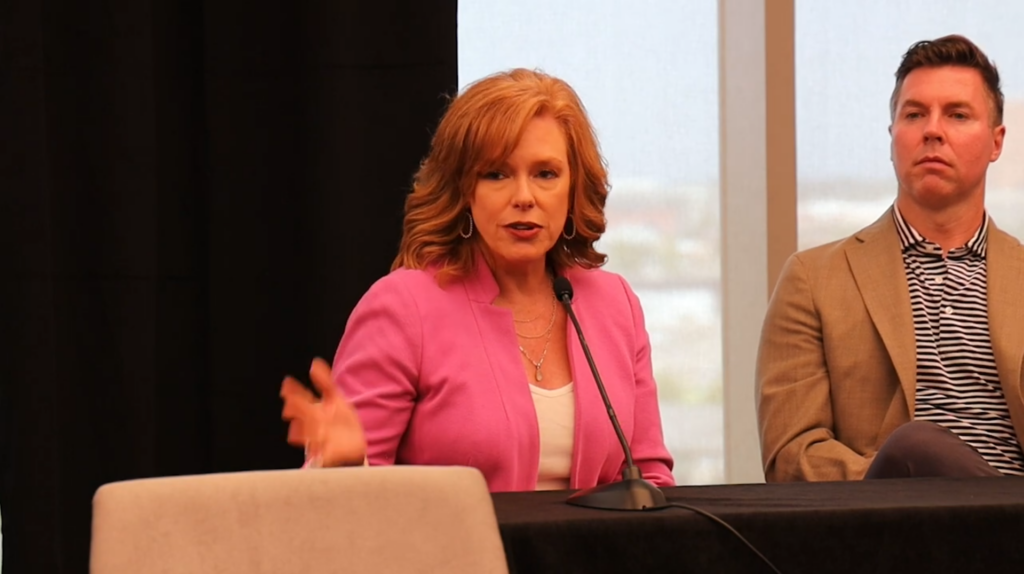OKLAHOMA CITY (OBV) – Kids throughout Oklahoma are now back in school, but there are some different guidelines for both K-12 students and educators this year that state leaders say will lead to better outcomes for Oklahoma’s future economy and workforce.
The change is thanks to House Bill 3278 – the Graduation Act of 2024.
Gov. Kevin Stitt signed House Bill 3278 into law in May, expanding graduation requirements to include career-readiness training.
“We really approach this from a perspective of more flexibility for our students and their families to choose the path they want to reach for graduation and then make their choice for what they do after graduation,” said Jenks Public Schools Superintendent Stacey Butterfield.

HB 3278, written by Rep. Rhonda Baker, R-Yukon, and Sen. Adam Pugh, R-Edmond, requires eighth through 12th grade students in Oklahoma public schools to complete modified graduation requirements starting in the 2025-26 school year.
The modified requirements include four math courses, including Algebra I and either Algebra II or Geometry.
Students must also complete six Individualized Career and Academic Plan (ICAP) pathway units that can span a range of subjects and career paths selected by the district board of education. New requirements also include a postsecondary-approved full-time CareerTech program or locally approved science-based application course to satisfy the required physical science unit.
The purpose of the modifications is to provide students training and education that will prepare them to enter the workforce upon graduation and start their career with the skills they will need to succeed.
The ultimate goal is to create better outcomes for Oklahomans by better aligning students career paths for future success, making more students college-, career- or military-ready – whichever pathway is best for them.
“You all get to decide. This is not a ‘Mother, may I?’ back to the the State Board of Education. You all get to decide as a local school board what classes count towards graduation requirements. You all get to decide, ‘Does this meet the level of rigor for someone who’s going to get a diploma from such and such high school,'” Pugh said during a conference of Oklahoma school superintendents and administrators.
Pugh is part of a group of lawmakers, business leaders and education leaders, including Oklahoma CareerTech Director Brent Haken, who came together to push through the landmark changes and improve the economic and educational environments in Oklahoma.
“When we look at the the real aspect of what we’re trying to do with education, and that education is only driven by the demand that is in our state for business and industry, then we realize that we have to make some changes. And so, it was just beautiful to see people working together, because we all want the same thing,” Haken said.
Input from educators was vital to creating the Graduation Act of 2024, according to Baker.
“We’ve got to bring these people in. Let’s sit across the table from one another and let’s have open dialog about what do you need. And it truly was probably the best experience that I’ve had in my entire career,” Baker said.

The State Chamber of Oklahoma was a leading advocate for the Graduation Act of 2024.
“We have different language that describes what these things were, but they were the same. And so, we kind of let our guard down and said, ‘Let’s work on stuff together,'” said Emily Crouch, senior vice president of Government Affairs for The State Chamber.
Schools are able to make changes to their graduation requirements as early as this fall for incoming 8th graders.
The new graduation guidelines will be required statewide beginning in the 2025-2026 school year.
The extra required math credit lines up our state to compete with others and also allows for that credit to be earned through courses relevant to a student’s pathway, like welding and aviation, said Bartlesville Public Schools Superintendent Chuck McCauley.
“Because there’s lots of skills that kids can learn, and they’re related to math as well as getting them in our internship program,” McCauley said.
“We now have the opportunity to do some innovative things. So, I really encourage us to step up and do them.”

















